Ukraine war: Bucha's wounds still raw two years on
- Published
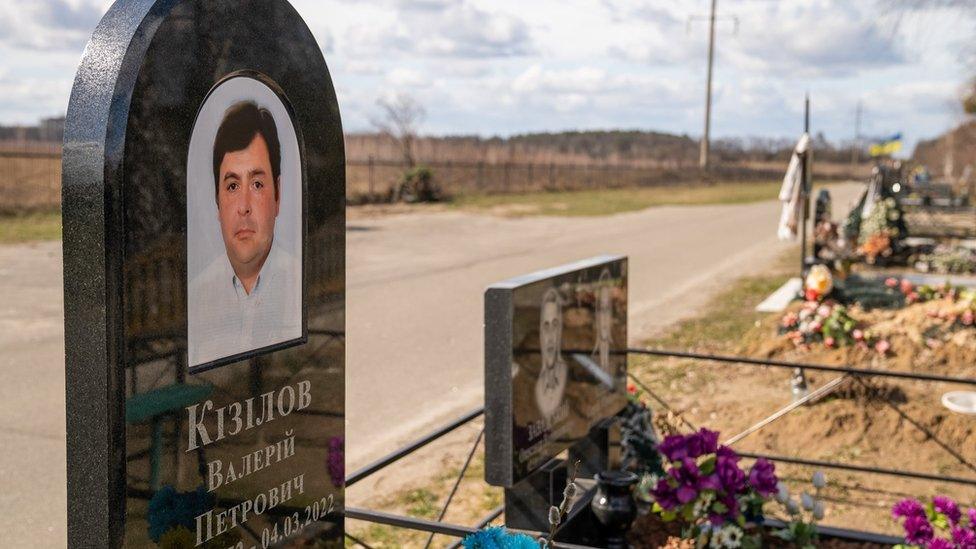
Ludmila has finally been able to install a headstone for her husband Valeriy's grave after two years
In March 2022 invading Russian troops occupied the Ukrainian town of Bucha outside Kyiv, leaving a trail of death and destruction which shocked the world. Two years after their departure, the BBC's Eastern Europe correspondent Sarah Rainsford has gone back to see how its traumatised residents are trying to return to normal life.
When Russian soldiers killed Ludmila's husband, she had to wrap him in a blanket and bury him at the back of their garden. She then fled Bucha with her daughter. It was March 2022. The Russians had occupied the small town just outside Kyiv and taken over the pensioners' home. Soldiers drove a tank into their yard and used the house opposite as their headquarters.
Two years on, Ludmila has finally installed a marble headstone on Valeriy's grave with his photograph. After Bucha was liberated, she was able to have him reburied properly at the local cemetery. The couple's home, destroyed in the fighting, is slowly being rebuilt. Ludmila has been planting bright coloured flowers in the yard. But when the house is finished, she will live there alone.
The building work is part of efforts to restore Bucha from the ruins left by retreating Russian soldiers. When Ukrainian forces retook the town, they discovered bodies strewn in Yablunska Street, where they had been shot. It was the first the outside world knew of the horrors Bucha had endured during 33 days of occupation.
"We have a moral obligation to support the families who live on that street, because more than 70 civilians were brutally killed and tortured there," explains the local mayor, Anatoliy Fedoruk.
Yablunska Street and the area around has been cleaned, spruced up and in some places rebuilt. But the Russians took over "almost every yard or house", according to the mayor, who estimates the total cost of repair at €1.6bn (£1.4bn; $1.7bn). "Of course we don't have this sum. But we are doing whatever we can to return people to their houses."
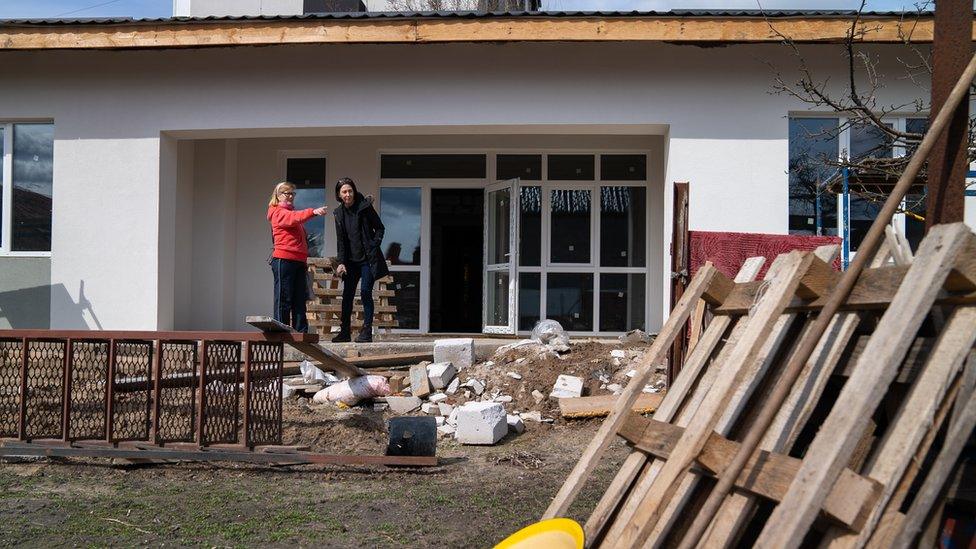
Ludmila is anxious to move back into her new home
Just a few steps from Yablunska Street, Ludmila's new home is still just a shell. The builders have promised to finish it by summer, but she hasn't seen them for days. Homeless for two years, on top of her bereavement, Ludmila is anxious to move in.
"I'm trying to cope, but my blood pressure is high, which it never was before the war," she says, showing me around the building site. "I'm getting heart scans, signs of problems. It's all from the stress. From the memories."
In 2022, I saw the burned-out wreck of Ludmila's old home not long after the Russians had pulled out. The yard was still heaped with alcohol bottles and wrappers from their military ration packs. It was the rubbish of men who had shot Ludmila's husband in the head when he surfaced for a moment from the cellar where the couple were hiding. She found Valeriy's body later that night, face down on their porch.
The investigation is still open, one of hundreds of suspected war crimes cases in Bucha. Ludmila was recently called in by police who had found new CCTV footage and hoped she might help identify the soldiers on film.
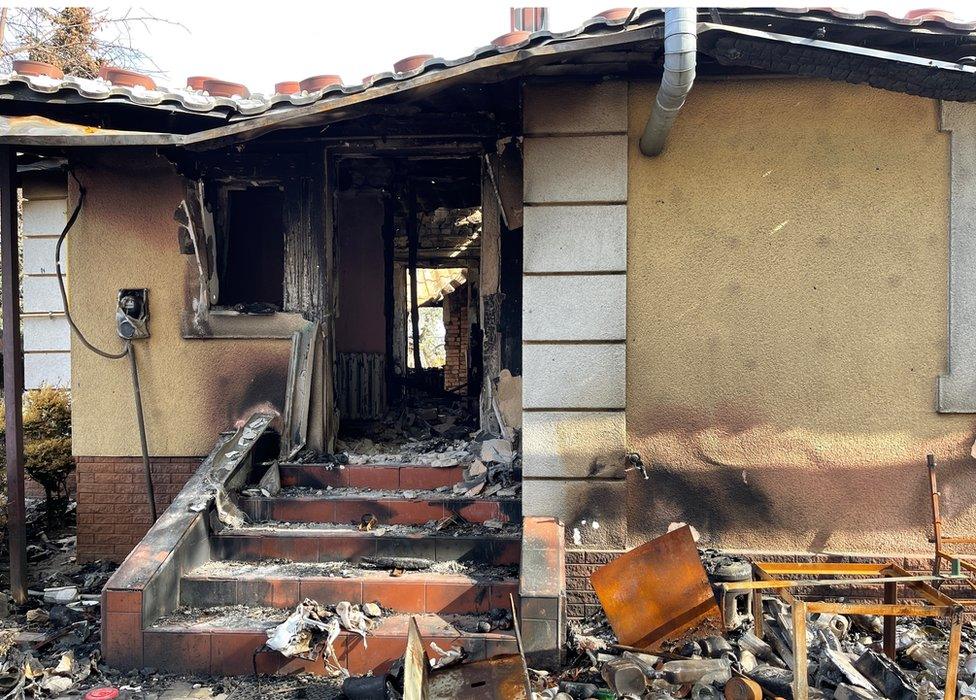
Ludmila's burnt-out house in a photo taken two years ago
"Maybe they can be charged in absentia. I know Russia will never hand them over," Ludmila says, realistic about the chances of anyone being held to account for the killing. "Personally, I'd like to grab them by the throat and demand to know why they had to come here," she says, suddenly animated. "They are scumbags."
Behind the white walls of St Andrew's Church, where many were buried in a mass grave during the occupation, there is now a memorial wall of metal plaques. So far it displays 509 names. Some squares are still blank because there are more than 100 unidentified bodies at the town cemetery, unearthed from shallow graves all over Bucha and reburied. DNA samples were taken first, in the hope that someone would one day come looking for them.
Other plaques on the memorial wall have no death date - only the month of March, when Bucha was under Russian occupation. Opposite is a sign that lists the dozens of people still missing. Among the names is Bohdan Kostyrenko, whose wife Natalia I first met in 2022. I was investigating the killing of five men from Bucha whose bodies had been found beneath a children's summer camp. Natalia's husband had been taken away by Russian soldiers and she feared he might be one of the dead. He wasn't.
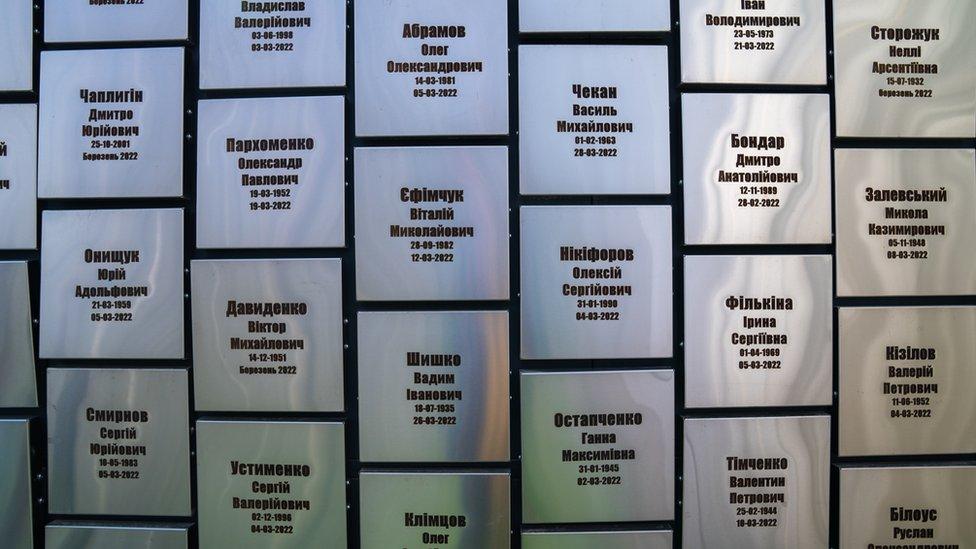
More than 500 names are displayed on Bucha's memorial wall
After months of searching, she finally traced Bohdan to a prison in Russia. "They took him to Belarus, then to Detention Centre Number Two in Bryansk [in Russia]," Natalia says. Through other Ukrainians swapped for Russian POWs, she learned that he was then moved to a facility in Tula, south of Moscow.
"Russia has officially confirmed he's a prisoner, but I had to find him through my own contacts," she tells me. "They should just give the civilians back, but they don't."
Bohdan retired from the army in 2019 with PTSD. As a civilian prisoner, Natalia fears his chances of being exchanged are slim, as only a few dozen non-combatants have been returned so far. "There are a lot of civilians from Bucha missing - people we know are in prison, but the Russians haven't confirmed. At least they've admitted to having Bohdan, officially."
Natalia has heard nothing from her husband directly since he was taken. But she knows from others held in Bryansk that they were tortured. "They say it was really hard - they were not fed, they were badly beaten, including with electric shock and pipes," she tells me. "Now I don't know what else to do. I can't get him freed. I can't find any way to do it."
Natalia herself is ethnically Russian. Both her parents are from the country now holding her husband prisoner illegally and accused of abusing him. It was people like Natalia that Vladimir Putin used as his excuse for invading Ukraine. He claimed they needed saving from brutal treatment at the hands of a "Nazi" government in Kyiv.
As we talk in the yard, children play football, laughing and shouting. Most of the pre-war population of Bucha has returned, including many who fled Ukraine as refugees. But Natalia worries things could deteriorate again. "You see what Putin's up to, blaming Ukraine for the Moscow terrorist attack," she tells me, referring to last month's attack on the Crocus concert venue. "I think he wants a full war. Full mobilisation."
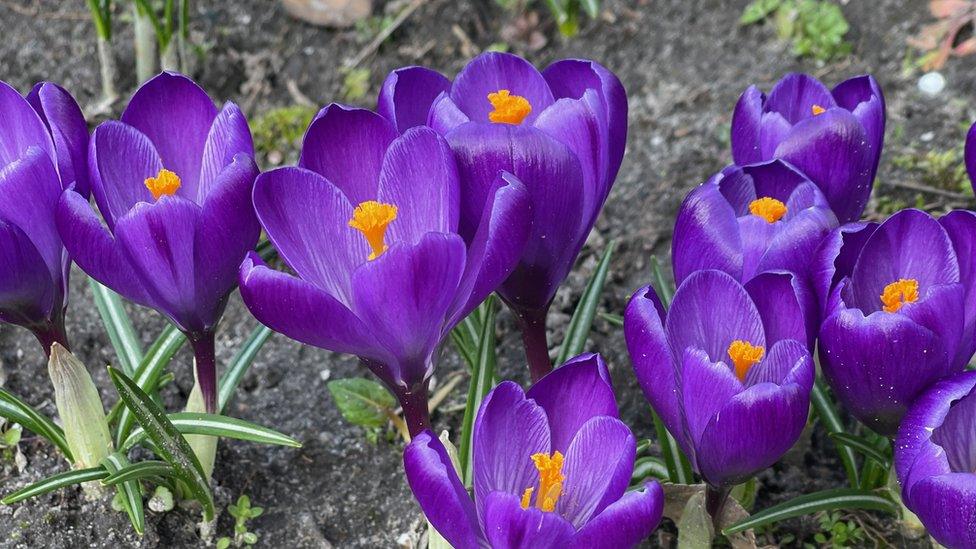
Across town, Ludmila is worried too, especially by the recent increase in Russian missile strikes. She keeps visiting her house to check on its progress and to be closer to her memories from before the occupation. She feeds Murka, the stray cat Valeriy once loved to photograph. Gardening distracts her when everything gets too much.
"There's such ruin, all over Ukraine! They're rebuilding here in Bucha and that's such joy. But there's no peace, no stability."
Ludmila shows me purple crocuses and bluebells in neat rows and the green shoots of daffodils. Then she leads me past the porch where Valeriy was shot, through a wooden gate onto the plot of land where she buried him. "Look how many tulips are coming out!" Ludmila points towards the spot, now a neat flowerbed again. "It used to be so lovely here. We'll soon have flowers again, all round the house."